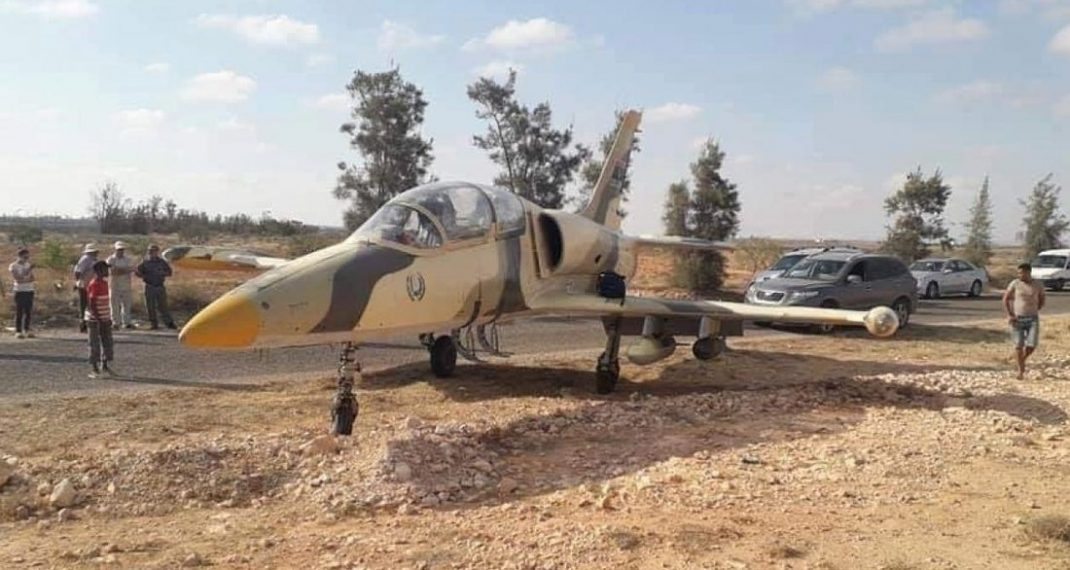
Both technical difficulties and defection from Khalifa Haftar’s LNA have been mooted as reasons for the L39 jet’s touchdown on a Tunisian road.
A Libyan warplane touched down on a road in eastern Tunisia’s Beni Khadash on Monday, with its pilot subsequently apprehended by Tunisian authorities.
The Tunisian defence ministry was quoted by state news agency TAP as saying the pilot, who holds the rank of colonel, said he landed in Tunisia due to technical difficulties.
Photos circulating on social media showed a warplane by the side of a narrow, paved road, in a dusty and deserted area, with onlookers observing.
The L39 fighter jet breached Tunisian airspace at 7:30 am, and landed in the region of Medenine before the military intercepted it, TAP reported.
Middle East Eye understands that the jet was travelling between the Brak al-Shati and al-Watiya air bases, and belongs to the self-styled Libyan National Army (LNA), a force led by eastern-based commander Khalifa Haftar.
However, the aircraft touched down more than 150km away from its intended destination, leading to specualtion that the pilot may have been defecting.
The LNA is currently embroiled in an offensive against the United Nations-backed government in the capital Tripoli.
“According to an LNA source, the crew member had a navigation problem. But it could also be a defection,” analyst Arnaud Delalande told MEE.
Delalande noted that the LNA has been carrying out an intensive air campaign over Tripoli, but only 30 percent of its fleet was operational, which likely led to it attempting to transfer the L39 to an air base closer to the Libyan capital.
The UN-backed Government of National Accord has said the warplane is not part of its fleet, the Reuters news agency reported. The LNA has yet to comment.
***
Libya: Tripoli-based gov’t strikes hit Haftar forces
By Gulsen Topcu
UN-recognized Government of National Accord targets positions of Haftar forces in south of Tripoli.
Airstrikes of Libya’s Tripoli-seated Government of National Accord (GNA) Sunday struck forces led by the commander Khalifa Haftar in south of the capital Tripoli, a military official said.
The airstrikes targeted positions around the Valley of Spring and the old airport, Mustafa Al-Majai, a spokesman of the GNA’s military operation against Haftar, told Anadolu Agency.
He said the airstrikes destroyed scores of military vehicles.
In April 4, Haftar announced the launch of a campaign to capture Tripoli, which faced a counter-operation by the GNA forces.
Libya has remained beset by turmoil since 2011 when a NATO-backed uprising led to the ouster and death of Gaddafi, the long-serving dictator after more than four decades in power.
Since then, the country’s stark political divisions have yielded two rival seats of power — one in Tobruk led by Haftar, and the UN-recognized one in Tripoli — and a host of heavily armed militia groups.
Writing by Burak Bir
***
Libya: Government forces foil Haftar attack, capture 11
By Walid Abdullah
Haftar attack waged at various sites south of Tripoli including Al-Khula, Ain Zara, and El-Sbeaa, says government spokesman.
Libya’s UN-backed Government of National Accord (GNA) on Monday said its armed forces foiled a “fierce attack” by forces affiliated with rival Khalifa Haftar south of the capital Tripoli, capturing 11 Haftar-affiliated fighters in the process.
The GNA forces “still retain their positions,” Mustafa Al-Majai, a spokesman of the GNA’s military operation against Haftar, told Anadolu Agency.
Haftar forces suffered large equipment losses during the battle, he added.
The Haftar attack was waged in various sites south of Tripoli including Al-Khula, Ain Zara, and El-Sbeaa, and the latter witnessed the capture of the Haftar-affiliated fighters, according to Al-Majai.
No immediate statement on the situation was available from the Haftar forces.
In April 4, Haftar announced the launch of a campaign to capture Tripoli from GNA forces.
Clashes between the two sides since then have left more than 1,000 people killed and about 5,500 wounded, according to the World Health Organization (WHO).
Libya has remained beset by turmoil since 2011 when a NATO-backed uprising led to the ouster and death of President Muammar Gaddafi after more than four decades in power.
Since then, the country’s stark political divisions have yielded two rival seats of power — one in Tobruk led by Haftar, and the UN-recognized one in Tripoli — and a host of heavily armed militia groups.
____________





